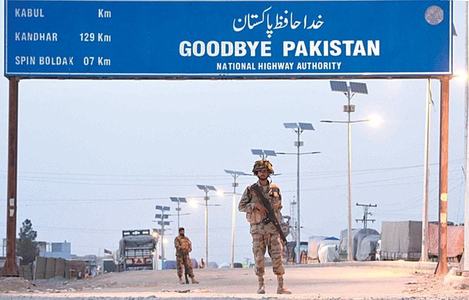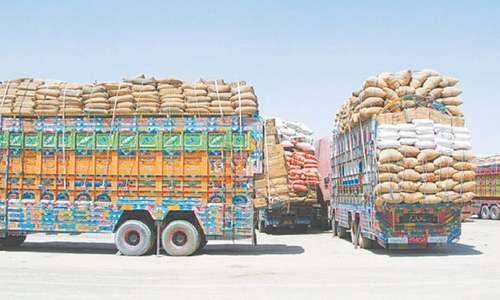THE corporate sector’s goodwill seems to be waning as the government juggles to leverage its geopolitical advantage in Afghanistan and sustain the growth momentum amidst ballooning current account deficit exerting pressure on the currency, stubborn inflationary pressures and growing public discontent over limited jobs and static salaries.
In the midst of the Covid-19 crisis last year, the PTI government doled out a generous multi-trillion-rupee stimulus package to support businesses and to facilitate their revival. The corporate sector responded with glee and drove the economy to a quick recovery. The country posted 3.9 per cent growth in 2020-21 after contracting 0.5pc in 2019-20.
The current handling of affairs by the government, particularly after the Taliban takeover in Afghanistan, has perturbed the private sector. The executives of leading companies are particularly uncomfortable over the growing critical voices against Pakistan and the threat of a probable backlash from the West and the East for aligning too closely with an ultra-conservative regime next door.
“We are grateful to Prime Minister Imran Khan for pro-business initiatives in the wake of the Covid-19 pandemic, but the growing hostility towards Pakistan in key export markets can cripple the industry and reverse the gains of the past few months. In case the Taliban government fails to satisfy China over its concerns, our troubles can multiply manifold.
“No, we, the businessmen, are not in a position to dictate the diplomatic agenda, but the government needs to mindful of the cost of disruption in the export markets before posturing,” a senior executive told Dawn privately.
While the private sector at large seems to be feeling a bit jittery there are others who see the glass still half-full
“The dark clouds are gathering again on the economic horizon. The nervousness in executive corridors can be gauged from the market behaviour,” said another tycoon, hinting at the current trends in the capital and currency markets of Pakistan.
The recently circulated business agenda of the PTI government based on Economic Advisory Committee (EAC) recommendations titled ‘Book 1’ failed to pacify the nervous private sector.
“Please educate me if I am too naïve. How is this book any different from earlier such documents? What does it do to deal with the problem at hand — prioritising politics over economy?” asked a frustrated textile tycoon from Punjab, worried over the delay in Christmas orders from his partners in Europe and the United States.
“They can sing and dance to their heart’s content over a friendlier regime in the problem-infested Afghanistan, but if the US and Europe decide to play their hostility though World Bank, International Monetary Fund (IMF), Financial Action Task Force, etc, the party can end abruptly,” he warned.
Arif Habib, founder of the Arif Habib Group and an EAC member, felt no point in overplaying business community’s concerns when he says, “the two most important figures in the balance sheet, top and bottom lines, spell success.” The top line refers to company’s gross revenues and the bottom line is net income.
“The pre-Covid gloom in the industry has given way to euphoria as companies have surprised themselves with the turnaround. I am not anxious watching the economy closely. Yes, current account deficit and inflation do pose a challenge. Unemployment problem has not subsided but in IT, construction-related industries, agriculture and textiles, the demand for labour has increased significantly, driving wages up. There are certain sectors like hospitality, airlines, etc that have yet to rebound.
“I headed the construction committee of EAC. About 80pc of our suggestions were inserted in the last budget. Yes, the challenges are huge, but the government is open to ideas and is receptive. I am confident that we will ride through this difficult patch,” he said over the phone.
Ehsan Malik, CEO of the Pakistan Business Council (PBC), said they have been engaging with the government on the revival of industry, long-term policies for export growth, import substitution, reforms in the fiscal policy to promote scale, and reduction in bureaucratic regulations.
“We are happy to see many of our recommendations reflected in ‘Book 1’. We were though surprised to see the suggestion on National Accountability Bureau (NAB) law reforms missing. The activism of NAB has paralysed decision-making. Another missing one is about developing a cross-party consensus on economy.
“Agreed, the agenda is an important first step, but the real challenge is to effectively implement it. Fragmentation between the provinces and the centre, and silo working of various ministries will need to be addressed. Also knee-jerk revenue-seeking and short-term measures which thwart long-term growth should be resisted”.
Dr Rashid Amjad, an economist who sits on the EAC, defended ‘Book 1’, arguing that the EAC was not just a think-tank, but a body that suggested macro and sectoral policies that are drawn up with the active participation and ownership of the stakeholders.
Referring to the criticism of being yet another routine exercise and some inconsistencies (trade-offs), he said: “This EAC report does serve a purpose. It came up with concrete steps to boost exports and to reform the energy sector. It also draws attention to sectors like domestic commerce, minerals and the informal economy.
“The real test, however, has yet to come. How does it help the government in adjusting to a fast-changing economic situation with rising commodity prices and widening current account deficit? How to sustain the growth momentum? And how to bring back the IMF on board without alienating the ordinary people who have no stomach for another round of increase in energy and other utility prices?”
He advised the government to call EAC meeting to help it in building its case with concrete plans to convince the IMF to restart its programme.
Published in Dawn, The Business and Finance Weekly, September 13th, 2021















































